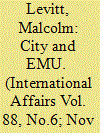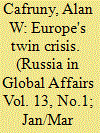| Srl | Item |
| 1 |
ID:
117353


|
|
|
|
|
| Publication |
2012.
|
| Summary/Abstract |
This article examines four elements of City of London thinking related to Economic and Monetary Union (EMU) and European financial regulation, and includes previously unpublished material.
City opinion on EMU and prospective UK membership has been divided. Sceptics have rightly stressed the risks facing a monetary union of disparate economies without a robust fiscal framework, but naively believed that threats to the City from EMU members could not arise because of the rules of the single market. Enthusiasts wilfully neglected the economic risks but emphasized the regulatory threats to City competitiveness if the UK were outside. The UK regulatory philosophy stressing freedom for cross-border competition and light regulation of financial markets was never accepted by many continental member states, numerous impediments to competition persisted and potentially damaging attempts were made to exclude the City from key financial and legal provisions on the grounds that the UK was not participating in EMU. Being at the negotiating table averted those threats, but now goodwill has levelled off and the liberal regulatory philosophy is in retreat. Despite reservations about EMU, City institutions made crucial but little-known contributions to the practical implementation of the euro, stressing the scale and nature of the tasks of converting banking IT systems, the logistics of changing notes and coins and the need for legal certainty. They helped to persuade the European Commission to accept the phased introduction of the euro and the legal framework.
Now EMU faces an existential threat and the financial system faces more regulation at EU and UK levels. The position taken by the UK at the December 2011 European Council, ostensibly defending the City but risking marginalization, dismayed many City figures who would be more willing to compromise to preserve access to the single market-but Eurosceptic hedge funds, the least regulated financial sector, retain considerable lobbying power.
|
|
|
|
|
|
|
|
|
|
|
|
|
|
|
|
| 2 |
ID:
047871


|
|
|
|
|
| Publication |
Houndmills, Macmillan Press Ltd., 1996.
|
| Description |
xii, 196p.
|
| Standard Number |
0333653947
|
|
|
|
|
|
|
|
|
|
|
|
Copies: C:1/I:0,R:0,Q:0
Circulation
| Accession# | Call# | Current Location | Status | Policy | Location |
| 043732 | 341.242/WEL 043732 | Main | On Shelf | General | |
|
|
|
|
| 3 |
ID:
138206


|
|
|
|
|
| Summary/Abstract |
The crisis of the eurozone has accelerated processes of uneven development and political fragmentation in Europe. Once celebrated as a dramatic forward movement in European regional integration, the monetary union has evolved under German leadership into what has been aptly described as "eurozone fiscal colonialism." The Franco-German partnership - the motor force of integration since the early 1950s - has shattered amid Frances resentment of German-imposed fiscal rules and declining competitiveness. Germany's authority over the eurozone is virtually unchallenged. As the EU's response to the war in Ukraine vividly illustrates, Germany has now also emerged as the predominant political power in the EU.
|
|
|
|
|
|
|
|
|
|
|
|
|
|
|
|
| 4 |
ID:
051298


|
|
|
|
|
| Publication |
New York, Oxford University Press, 2000.
|
| Description |
ix, 311p.
|
| Standard Number |
0199241651
|
|
|
|
|
|
|
|
|
|
|
|
Copies: C:1/I:0,R:0,Q:0
Circulation
| Accession# | Call# | Current Location | Status | Policy | Location |
| 048127 | 337.142/DYS 048127 | Main | On Shelf | General | |
|
|
|
|
| 5 |
ID:
120570


|
|
|
|
|
| Publication |
2013.
|
| Summary/Abstract |
THE CURRENT CRISIS of the Economic and Monetary Union (EMU) is traditionally described as an illustration of the fact that the euro area was caught unprepared for such a high degree of integration. The crisis of financial markets, which began in 2007, has no doubt exposed systemic problems of monetary integration in the EU. Their essence is the weakness of the scheme under which countries are deprived of monetary tools to influence the economy by seceding them to the supranational level, but keep almost complete freedom of action in the macroeconomic sphere (particularly in fiscal policy, in determining the value of labor power, in the social security system). The current crisis also shows that to retain the achieved level of integration is possible only by deepening cooperation and forfeiting another portion of sovereign rights.
|
|
|
|
|
|
|
|
|
|
|
|
|
|
|
|
| 6 |
ID:
145785


|
|
|
|
|
| Summary/Abstract |
This article seeks to explain through the contextualized comparisons of a few critical cases how national preferences on an interstate bargaining issue are formed domestically. It proposes an interaction framework of national preference formation (NPF), which emphasizes the government's policy autonomy, the size of the ruling party or coalition, and the party unity in aggregating divergent domestic preferences for interstate bargaining. The framework is tested against major European Community members' preference formation on Economic and Monetary Union (EMU). Case studies reveal that the interaction framework quite accurately describes the national preferences of Germany, Britain, and France over EMU.
|
|
|
|
|
|
|
|
|
|
|
|
|
|
|
|